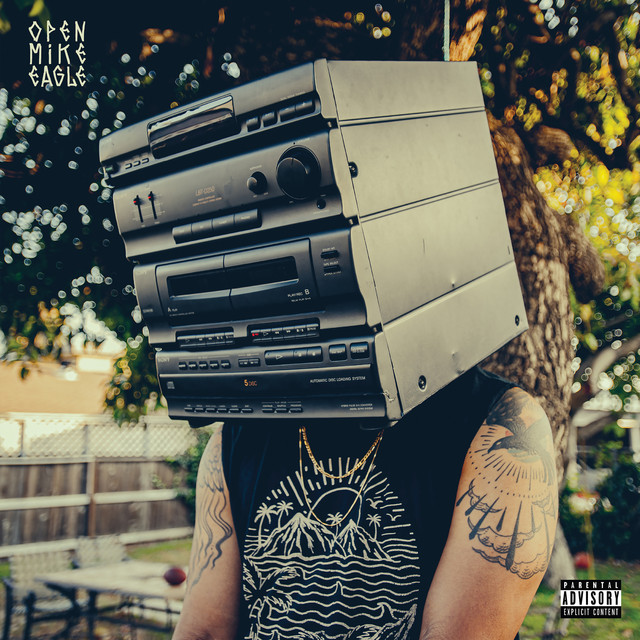The phrase “rap show,” for the average person, likely evokes images of a bunch of teens and twentysomethings ready to mosh and go crazy. The scene at Beat Kitchen’s performance space a few minutes before Open Mike Eagle’s set, however, looked like something out of a mixer for divorced parents: The crowd was made up of mostly middle-aged, and older folks—all rap fiends in their own right—ready to bop to the old-school beats and rhymes of their younger days.
And why shouldn’t it be that way? In his 2022 album Component System with the Auto Reverse (CSAR), the 42-year-old hip-hop artist rediscovers his identity with a soundtrack that combines retro boom-bap rap beats (a ’90s production style that used prominent bass and snare drums) with more contemporary sounds. This reconciliation of new and old pervades CSAR, as Eagle uses his humor and acerbic wit to contemplate both his past experiences and the absurdities of the present. What Eagle creates are not songs but rather two- to three-minute-long skits, montages of fragmented images and experiences, each of which captures a different aspect of Eagle’s life. In these skits, Eagle and his collaborators are the performers, the comics. And just as a comedy show relies not only on content but also on timing, delivery, and chemistry, so too are Eagle’s songs synergies of various aspects of performance. The difference, then, between streaming an Eagle track and watching it live becomes the difference between watching a comedy show on a screen and going to a club.
During his performance of the song “79th and Stony Island,” for instance, a massive screen behind Eagle ran product commercials from the 1990s as he, deadpan, discussed the bleakness of both his Chicago upbringing and his life today. And as the song went on, I felt it all: the frustration of having the perennially out-of-reach American Dream dangled before you (“Dream American dream”), the desolation of having one’s childhood squandered by reality (“I made a wish on the dishwater”), and the aimlessness of life today (“A cold world with no beach break”/… “I stay woke, I don’t sleep great.”) Fortunately, the set wasn’t all doom and gloom; it successfully distilled Eagle’s life journey as narrated in CSAR and moved from Eagle’s struggles (in “79th”) to their resolution (in “Circuit City”). Ever the versatile performer, Eagle assumed a more emotive, aggressive tone as he triumphantly explained his coming to terms with his present identity, rapping, “I’m a brand-new man doing the same dance.” The raw emotion in Eagle’s voice was particularly captivating, unadulterated by digital enhancement.
In this way, Eagle the artist used the various creative mediums at his disposal to convey his emotional experience. Meanwhile, Eagle the comic sprinkled the show with bits of humor, both in his songs and between them. For instance, Eagle’s references in “I’ll Fight You” ranged from an allusion to an altercation between a journalist and a semi-famous wrestler from 1984 (“Black out like John Stossel”) to wordplay involving modern-day memes (“Who among us is mega sus?”). These references, coupled with occasional dry bits of witticism between songs, lent a whimsical air to the whole experience.
Amid all of this talk about Eagle the comic and Eagle the artist, it is easy to forget about Eagle the rapper. More specifically, Eagle the rapper’s rapper. During the show, Eagle demonstrated his abilities as a wordsmith when he freestyled an entire verse—complete with its own bits of humor, wordplay, and layered rhymes—at the end of his 2017 song “95 Radios.” Furthermore, when he paid tribute to his idol, the late MF Doom—an underground rapper widely regarded as one of the greats— he reminded the audience that he is still a student of rap even a decade into his career.
By the end, my sole gripe with the show was with its audience: the assortment of middle-aged rap fanatics who surprised me when I first set foot in Beat Kitchen. Now, while I sympathize with the struggle against ageism, and though the crowd seemed to appreciate the show, they were missing a certain energy present in most rap concerts. By “energy,” I mean that ostensible enthusiasm that propels everyone in attendance to a rhythmic frenzy, that concert-spirit that drives audience members to lip-synch every word and jump to every beat. Perhaps this energy was missing because the show’s songs were from a new album, with which the crowd was less familiar. Or perhaps the frenzied crowd is one that, to quote “Circuit City,” listens to “stoner rap that don’t rhyme”—how Eagle describes the type of rap prevalent today. Eagle set out to rediscover his identity with his latest album and found it in the audience that night, an audience of old-school hip-hop heads with the savvy to keep up with modern times but an aversion to the hype-chasing stream bait that makes up the majority of modern rap. Both Eagle and his audience wanted only to continue doing what they loved and to revel in the experience of doing so.








